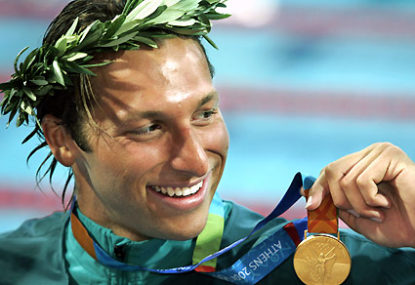Look, among the many Australian failures in the Olympic swimming tournament, we can probably find a place for someone who didn’t actually swim at all, Ian Thorpe.
Thorpie was hired by the BBC, apparently for a reported $10,000 a day, to provide colour and commentary for their swimming coverage.
Read more: Not everything’s barmy on the BBC
The British press is pretty savage about colonials at the best of times, but the criticism of Thorpe was torrid.
First up, they didn’t like what he was wearing: a striped jersey and shirt that had more of a south of France aspect to it rather than the tailored London look.
Second, what he had to say was pedestrian and statements of the obvious.
As an aside, I would make the point that it is rather insulting to the trade of journalism that broadcasters believe that someone who has excelled as a sporting champion will automatically be able to express more interesting insights into tactics and what is actually happening in the pool or on the track than someone who has been trained to be an articulate observer.
When you get a great practictioner who is also a gifted broadcaster, someone like Richie Benaud, then you have broadcasting gold.
But apparently, Thorpe was bronze at the very best.
For along with the pedestrian statements of the obvious, Thorpe had what his audience in the UK said was a ‘look’ problem.
Every sentence, apparently started with a ‘look’ and then the ‘look’ word punctuated the rest of his comment, rather like a series of verbal speed-humps slowing down the flow of words.
The UK Daily Telegraph, a pukka broadsheet that loves to provoke Australians, reckoned that the use of the word ‘look’ is a peculiarly Australian verbal mannerism.
When I read this, I started actually listening to some of the other Australian commentators.
And, look, what I found was that the ‘look’ word was ubiquitous. So there was Tony Jones, for Channel 9, talking about the hockey to Ken Sutcliffe.
Look, I swear every second word was ‘look.’
Believe me, it was not a good look.
Even Grant Hackett, who I thought was doing a good job explaining what was happening (or not happening as far as our swimmers were concerned) in the pool, degenerated into using the ‘look’ word when he trying to buy time for his thoughts to explain the seemingly unexplainable, which was the collapse of James Magnesson’s assault on gold, gold for Australia!
I once wrote an article for the SMH on the rising inflecTION at the end of the sentence.
The experts told me that it had to do with feminism and the delicacy of feminists in countering the argument of their colleagues not to hurt their feelings. So they ended their sentences opposing a colleague’s argument with a sort of rising inflection that left the issue slightly open.
But, look, I don’t think we can blame the use of the ‘look’ word on the feminists.
My theory is that several things are at work with the use and over-use of the ‘look’ word.
First, there is a natural tendency with speakers who are unsure of the validity of their arguments and statements to use a sort of hold word from time to time to give them time for more thinking and to give what they say an element of assurance.
The patrician hypocrite Malcolm Fraser used to punctuate his tedious platitudes with liberal doses of ‘you know.’
Wayne Swan, who was kindly described as the ‘village idiot’ of Australian politics, punctuates his riffs on the Boss and politics and the evils of Tony Abbott with the incessant use of ‘of course’ even when it is plain to everyone (but probably not to him) that what he is saying is nonsense rather than good sense.
So my theory is that ‘look’ is taking over from ‘you know’ and ‘of course’ as the phrase to fill in gaps in a sentence when the bottom seems to be dropping out it.
As a sort of proof of this Zavos Law of Platitudes, I would suggest that the best of the commentators at the Olympics, the ones who are adding great value to the experience of watching while they are explaining what is happening never, never use ‘look’ to grab our attention.
Here I would express my total admiration for the commentary work of Steve Ovett on the Fox Sports network during the track events.
Like so many people, I also supported Sebastian Coe in his spats and contests with Steve Ovett. Ovett came across as a Roundhead and Coe as a Cavalier.
But rather than being a dour, puritanical type Ovett’s commentary reveals a person with a great sense of humour and, more importantly in his job of commentating on the track events, with a profound knowledge of the tactics of racing and the psychology of the runners.
I put Ovett in the same category of practictioner/broadcaster as the great Richie Benaud, the highest possible praise that can be given to a commentator on sports, in my opinion.
Ovett is so good he even makes the Australia’s relative lack of success (with the exception of Sally Pearson) on the track in comparison to the UK men and women almost bearable.
London 2012 Olympics – Day 11 Gallery
[roargal]
See the complete London 2012 Olympics gallery





























































































